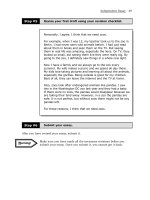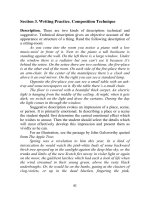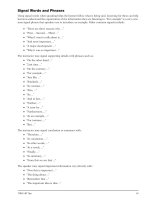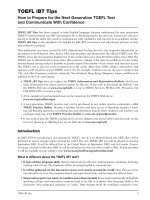Ibt tips 5 doc
Bạn đang xem bản rút gọn của tài liệu. Xem và tải ngay bản đầy đủ của tài liệu tại đây (364.75 KB, 6 trang )
18 TOEFL iBT Tips
Sample Lecture from the Same Ecology Class
The question asks them to briefl y synthesize and summarize the information from the reading and listening
material.
TOEFL iBT Tips 19
Integrated Speaking—Listen/Speak
Test takers listen to part of a conversation or lecture. The question asks them to briefl y summarize
the information from the listening material. For some tasks, the question asks them to summarize the
information and express an opinion about it.
What is different?
The entire section is new since there is no Speaking section on the paper-based or computer-based TOEFL
test. Test takers who must submit a speaking score currently take the Test of Spoken English
TM
(TSE
®
)
separately.
20 TOEFL iBT Tips
D. TOEFL iBT Writing Section
Academic Writing Skills
The Writing section measures test takers’ ability to write in an academic environment. In English-speaking
academic situations, students need to present their ideas through clear, well-organized writing.
• Often students need to write a paper or response on an exam on something they are learning about in
their classes. They need to combine information they have heard in their class lectures and read about
in their textbooks or other reading materials. This type of writing can be referred to as integrated
writing. In this type of writing students need to be able to
• take notes on what they hear and read and use them to organize information before writing
• summarize, paraphrase, and cite information from the source material accurately
• write about the ways the information they listened to relates to the information they read
For example, in an academic course, a student might be asked to compare and contrast the points of
view expressed by the professor in class and in the assigned reading material. The student must suc-
cessfully draw information from each source to show the contrast.
• Students also need to write essays that express and support their opinions based on their own knowl-
edge and experience. This type of writing can be referred to as independent writing. In this type of
writing, students need to be able to express an opinion and support it based on their own knowledge
and experience.
For example, a student may be asked to write an essay about a controversial issue. The student uses
personal experience to substantiate his or her position.
In all types of writing, it is helpful for students to
• identify one main idea and some major points to support that idea
• plan how to organize the essay (e.g., with an outline)
• develop the essay by using reasons, examples, and detail
• express information in an organized manner
• use effective linking words (transitional phrases) to connect ideas and help the reader understand the
fl ow of ideas
• use a range of grammar and vocabulary for effective expression
• use grammar and vocabulary accurately; use idiomatic expressions appropriately
• follow the conventions of spelling, punctuation, and layout
TOEFL iBT Tips 21
Description of the TOEFL iBT Writing Section
The total time for the Writing section is 50 minutes. Test takers write their responses to two writing tasks.
(See below.) Their responses are typed on the computer and sent to ETS’s Online Score Network.
Writing Task Types
Task Type Task Description
Task 1:
Integrated Writing Task
Read/Listen/Write
• Test takers read a short text of about 230–300 words (3 minutes’ reading time) on an
academic topic.
• Test takers may take notes on the reading passage.
• The reading passage then goes away during the lecture that follows; it reappears when
it is time for the test takers to begin writing so they can refer to it as they are working.
• Test takers listen to a speaker discussing the same topic from a different perspective.
The listening passage is about 230–300 words long (or about 2 minutes’ listening
time).
• The listening passage provides additional information that relates to points made in
the reading passage; test takers may take notes on the listening passage.
• Test takers are asked to write a summary in connected English prose of important
points made in the listening passage and explain how these relate to the points made
in the reading passage. Suggested response length is 150–225 words; however, there
is no penalty for writing more, as long as it is in response to the task presented.
Task 2:
Independent Writing
NOTE: This is the same
type of task on the
computer-based TOEFL
and the Test of Written
English
TM
(TWE
®
).
• Test takers are asked to write an essay that states, explains, and supports their opin-
ion on an issue. An effective essay will usually contain a minimum of 300 words; how-
ever, test takers may write more if they wish.
• Test takers need to develop support for their opinions or choices, rather than simply
listing personal preferences or choices.
• Typical essay questions begin with statements such as:
• Do you agree or disagree with the following statement? Use reasons and specifi c
details to support your answer.
• Some people believe X. Other people believe Y. Which of these two positions do you
prefer/agree with? Give reasons and specifi c details.
22 TOEFL iBT Tips
Integrated Writing—Read/Listen/Write Example from a Business Class
TOEFL iBT Tips 23
Independent Writing
What is different?
The TOEFL iBT Writing section has two writing tasks as opposed to a single essay. The integrated writing
task has been added to the test. The independent writing task is similar to the CBT essay and the Test
of Written English (TWE), which is administered with the paper-based TOEFL test. Also, typing is now
required. (The vast majority of test takers on the computer-based TOEFL test choose to type their essays.)









